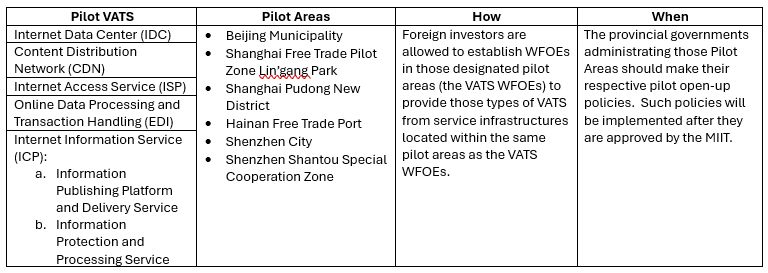On April 8th, 2024, the Ministry of Industry and Information Technology (the "MIIT") issued an announcement (the "Announcement") to allow wholly foreign-owned enterprises (the "WFOEs") to engage in certain value-added telecommunications services (the "VATS"). According to the Announcement:

Coincidentally or not, these VATS are the key components of a functional full-service cloud computing service. Opening these VATS to wholly foreign owned enterprises in the Pilot Areas means that wholly foreign-owned cloud service will become feasible in China mainland area, which is a long-awaited development and an icebreaker for foreign cloud service providers. Imagine that Amazon could wholly own AWS and Microsoft could wholly own Microsoft Cloud in China mainland area, and many other foreign cloud brands. Of course, whether to have a wholly owned cloud business is a decision based on multiple factors, and the market entry policy is only the threshold factor among all the factors (such as the cost of investing and maintaining a wholly owned operation, overall compliance burden, etc.).
In addition to the cloud computing service, the Pilot VATS in the Announcement are the most frequently required telecommunication services for virtually all popular non-contents-intensive online services, such as e-commerce, electronic payments, IOTs, blockchain-based services, etc. The Announcement opens the door for foreign investors to enter the online services market in China mainland area, except that the foreign investors entering this market will face their local competitors who are already very powerful, advantageous, flexible, and efficient in many areas of the online services.
Before this Announcement:
- IDC is not open to foreign investors in China mainland area (except for Hainan Free Trade Port).
- CDN is not open to foreign investors in China mainland area (except for Hainan Free Trade Port).
- ISP is only open to foreign investors in the form of 50-50 JV within the pilot free trade zones and the areas with equivalent policies, which can only serve customers within its pilot free trade zones or the areas with equivalent policies.
- EDI is only available to WFOEs for the e-commerce business in China mainland area, but with de facto
- ICP is only open for foreign investors in the form of 50-50 JV in China mainland area, but with no new ICP JVs have been approved for years. App Store business of ICP is open to wholly foreign-owned enterprises in all pilot free trade zones and the areas with equivalent policies, but with de facto
Restrictions:
- The Information Publishing Platform and Delivery Services opened for VATS WFOEs excludes internet news information services, online publishing services, online audio and video services and internet culture businesses.
- A VATS WFOE may only use service infrastructures located within the same Pilot Area where it is located to provide the Pilot VATS and may not use self-owned or third party CDN services outside of its Pilot Area to facilitate access to its Pilot VATS.
- All the Pilot VATS may serve customers located anywhere within the mainland area of China, except for the ISP. A VATS WFOE providing ISP service can only serve customers within its Pilot Area and can only use the internet access equipment provided by the basic telecom carriers to provide its ISP service.
- VATS WFOEs should follow the opening-up policy of its Pilot Area to apply to the MIIT for the approval of their Pilot VATS before they can provide the Pilot VATS. In providing the Pilot VATS, VATS WFOEs must comply with the provisions of the applicable laws and regulations and the requirements in their Pilot VATS approvals and must accept and cooperate with the supervision and administration by the telecom regulators and other relevant authorities.
Regulation of the Pilot Areas:
- MIIT should take the lead to evaluate the Pilot VATS opening-up and to determine when and how the Pilot VATS opening-up could be made available in other areas in the China mainland area.
- Local telecom administrations should take the lead in supervising the operation of the VATS WFOEs to ensure that the operational compliance and the service quality of the Pilot VATS. They should establish a mechanism of VATS WFOEs business reporting and spot checks, strengthen the supervision of VATS WFOEs' cybersecurity and data security capabilities, and hold them accountable for their security responsibilities.
- MIIT may reduce the scope of Pilot VATS opening-up in a Pilot Area if there are frequent violations, many regulatory risks, and difficulties in ensuring the security and management of the Pilot VATS or the VATS WFOEs. In extreme cases, MIIT may terminate the Pilot VATS open-up in that Pilot Area.
What to Watch:
- Although the Announcement is expected to be implemented quickly, it will be worth watching how quickly all the Pilot Areas will submit their opening-up policies for approval and the MIIT will approve such opening-up policies.
- Since each Pilot Area should submit its respective Pilot VATS opening-up polices to MIIT for approval, it is worth watching whether there will be differences in the opening-up policies approved by MIIT for the Pilot Areas.
- As this is a pilot effort to open VATS, it is worth watching whether the true "national treatment" can be offered to the VATS WFOEs in the Pilot VATS operation.
The content of this article is intended to provide a general guide to the subject matter. Specialist advice should be sought about your specific circumstances.
